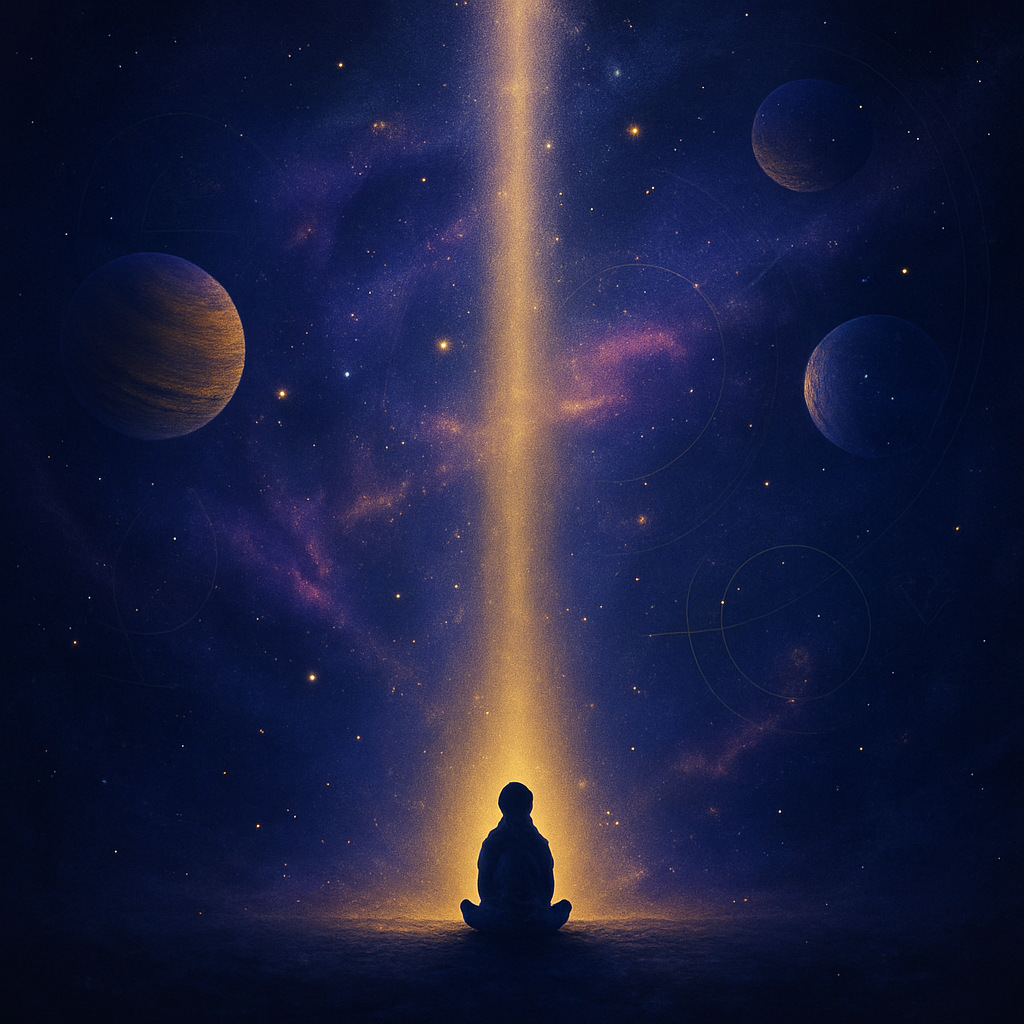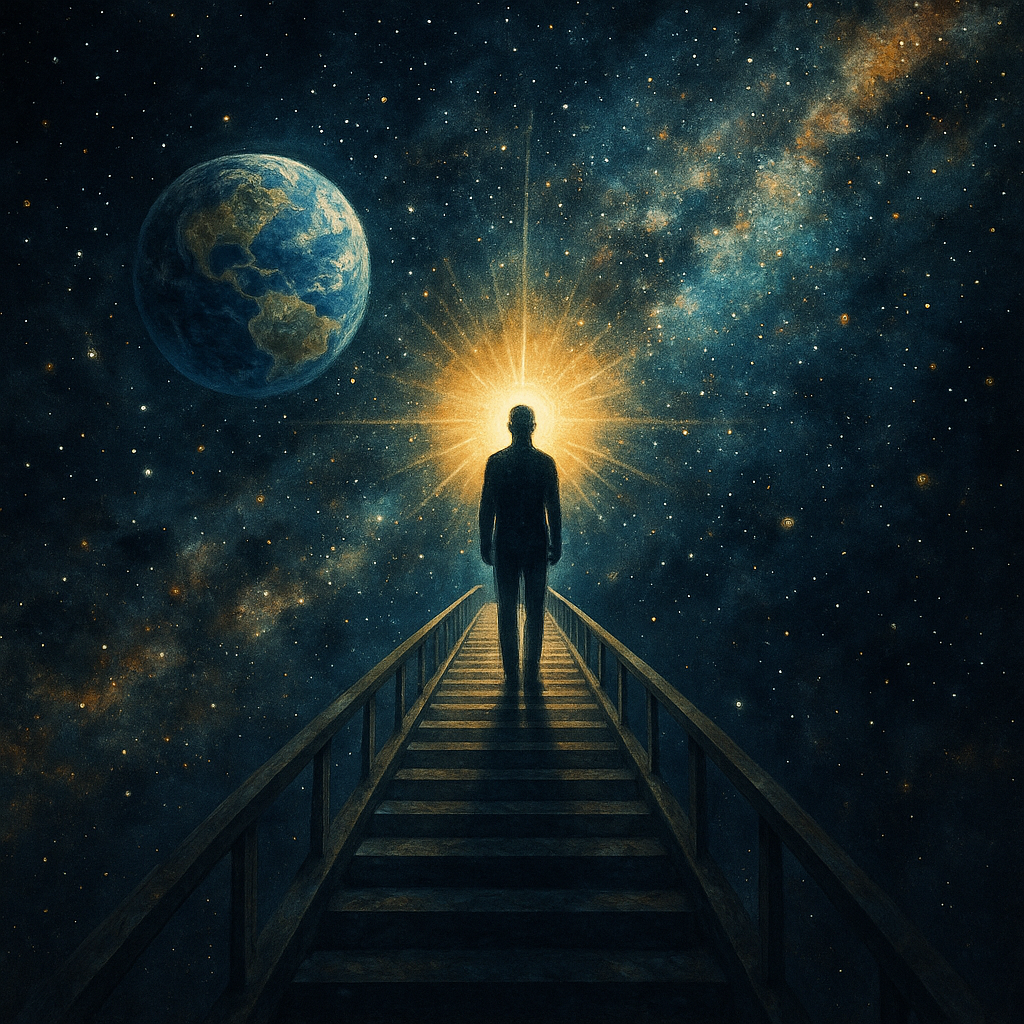Let's start with another scenario.
It's evening, work is over, everything is fine. We are lying on the couch, staring blankly at the wall. There hasn't been any troublesome situation; the weather is good, everything is going well at work, our relationship is great, we have done our sports, there is nothing to stress about or anything negative.
But it feels like a bear is sitting on our chest. It feels as if an emptiness, a cloud of meaninglessness has surrounded us and we are lost. And the strange thing is: even this feeling is meaningless. Now why is this happening all of a sudden? What happened?"
We had heard of an "existential crisis" somewhere, but we hadn't dug too deep into it. Maybe we can catch some clues that will disperse this cloud of meaninglessness.
In this article, we will go deeper into that shocking and endless questioning that we call "existential crisis", we will move a little bit in it and we will look for a ray of light that opens the door to the universe of meaning through this darkness.
If we can find it, we will try to discover together ways to follow this light and build a life of our own.
Tie your belts.
Philosophical and Scientific Background
Philosophical Perspective
What? If we don't create meaning, there is no meaning?"
What we call existential crisis is not a new fad of recent years. Since the 19th century, some philosophers have been concerned with this issue and thought deeply about it. Let's take a look at what they say together.
Our first stop: Søren Kierkegaard.
The Danish philosopher Kierkegaard asked the question "what is man?" as sincerely and painfully as a child might ask "why do we live?"
In his view, man is born with the responsibility to be himself. But this is not an easy thing. Fear, anxiety, uncertainty... These are all phenomena that arise when we begin to ask "who am I really?"
Kierkegaard, as a believer in God, thought that this anxiety could only be overcome by faith.
But he also knew that it is not easy. Because man is free. And with that freedom comes loneliness, the possibility of not being accepted and the price we pay for every choice we make.
Then Friedrich Nietzsche came on stage and stirred the pot.
When he said "God is dead", he was not really talking about the death of God, but about the collapse of the value systems that guide people's lives.
It sounds provocative, but it was not just provocation. What he really wanted to ask was:
"If there is no external authority to guide you, what will you live by?"
The answer was both simple and difficult: You will create your own values. No one else, you.
At this point let's not miss Viktor Frankl.
Frankl was a man who not only thought about the meaning of life, but experienced it himself in concentration camps, under inhumane conditions.
Frankl believed that what sustains human beings is the meaning they have. Even if he had lost everything physically, he could still survive if he "knew why he was alive."
This is why Frankl saw the search for meaning as the most basic need of the human soul.
There is a similar approach in psychology called logotherapy:
The aim is to help people find a purpose in life in order to overcome problems such as depression, anxiety and feelings of emptiness.
Frankl's famous quote sums it up very well:
"The meaning of life is not asked, life asks us questions."
These thoughts were also flamed by Albert Camus's look.
Camus's approach was simpler, but perhaps the most striking. For him, life was absurd:
Man seeks meaning, but the universe does not offer it.
On the question of what man should do in spite of this emptiness, Camus answers us with a legend: The myth of Sisyphus.
You take the stone up the hill, it rolls back down. You take it up again. The cycle goes on and on. According to Camus, this cycle, yes, seems meaningless. But if we remove that stone consciously, by our own choice, then there is meaning. In other words, the meaning is not the removal of the stone to the top of the hill, but the meaning we cling to without giving up, even if the result is negative.
Camus' message is clear:
Accept the absurdity, but never give up.
In conclusion, what these thinkers have in common is this:
We cannot wait for a ready-made meaning from outside. We are not exposed to life, we live life. Life is whatever meaning we ascribe to it.
Existence is not something that is presented to us in a packaged form; it is something that we weave together every day, with every choice we make.
Scientific Perspective
Brain, Meaning and the Sense of Emptiness
While philosophers have tried to make sense of existence, scientists have tried to get to the biological, psychological and neurological foundations of these inquiries.
In other words, they have investigated not only "why do we live?" but also "why does our brain ask this question?"
The human brain is precisely programmed to search for meaning.
It has a low tolerance for randomness and ambiguity. This is why we see shapes when we look at clouds, why we get upset when something unexpected happens, why we sometimes get angry.
The brain is constantly trying to turn the events around it into a coherent story.
This is related to both our need for security and our sense of self.
But it is precisely at this point, in every situation of uncertainty, in every event that seems meaningless to us consciously or subconsciously, that feeling of emptiness, a.k.a. existential crisis, comes into play, even if everything is fine.
Because it is not enough just to live, we want to live meaningfully. We ask ourselves where we are going as much as where we came from. We look at whether our life so far has been good, and we make plans for what we want it to be like afterwards.
Neuroscience research shows that the prefrontal cortex region of the brain is particularly responsible for decision-making, valuation and planning for the future. And coincidentally, this region is also one of the places that is activated during existential inquiries.
In other words, questions such as "who am I, why am I here?" are not only philosophical questions, but also biologically "real" questions.
These issues are also seriously addressed in the field of psychology.
Existentialist psychology suggests that a sense of meaninglessness can be at the center of conditions such as depression and anxiety. In particular, logotherapy, founded by Viktor Frankl, aims to overcome this feeling of emptiness by finding meaning
Modern psychology does not see this emptiness as a pathology. Sometimes these crises can be an opportunity to redesign one's own life.
This process is called post-traumatic growth, or "post-traumatic growth". In other words, a moment of crisis, if handled correctly, can lead to a stronger, more conscious and deeper view of life, to find meaning.
There is also a fact called neuroplasticity, which we have been talking about for many articles:
The brain can be reshaped according to the way we think. Meaningful experiences create new synaptic pathways. And these new pathways, over time, build a new inner world, a new "me".
Real Problems and Solutions
Problem:
It is useful to be honest with ourselves and not to be too hard on ourselves before we go into a problem.
We know that we are not just experiencing an individual "emptiness". It is almost as if the system we are in is programmed to produce this emptiness.
Society and the system constantly whisper to us:
Be faster, be more successful, always be happy.
What do we do? "We stay positive 🫠." A constant state of well-being, a constant expectation of high mood...
Even happiness is now expected to be measurable, to be demonstrated by success. As if this is not enough, social media polishes and polishes this illusion and puts it in front of us: Everyone is very happy, everyone is extremely productive, everyone is highly successful...
So why aren't we?
At this point, this constant state of "having to be" itself fuels the existential crisis. Because human beings don't just want a successful career, many followers, liked posts, everyone calling them successful; they want a meaningful life for themselves and for the meaningful future they create with their own hands.
Sometimes some events we experience can trigger this emptiness and make it bigger:
- Loss of a loved one
- End of a relationship
- Move, cultural changes
- Unemployment or the feeling of meaninglessness that comes after success/failure
- Or just "growing up", not knowing "who you are"...
In other words, this crisis is not a single moment, but an accumulating, multiplying and eventually overwhelming feeling.
Solution suggestions:
So what do we do now? Cover it up? Ignore it?
No!
In this article we will try something else.
We will try to open a window behind this wall step by step.
1 - Awareness: Let's Try Recognizing and Accepting the Crisis
The first step is to see this feeling of emptiness as a sign, not as a "disorder".
To honestly address the question "Why do I feel this way?"
To confront it rather than suppress it and try to understand exactly what the problem is. No judgment at this point, let's repeat to ourselves exactly what happened, without getting angry, laughing, crying, just realizing what happened.
If we can't find anything, just realizing that we are in this moment of existential crisis is enough.
2 - Questioning: Let's Discover Our Own Values
We put aside the identities that society has given us.
What do we believe in?
What really excites us, what really disturbs us?
We don't have to find clear answers to these questions quickly, the point is to go after the answer.
3 - Building Meaning with Small Goals
There is a phrase I like very much:
Be the change you want to see in the world.
If we have a problem, what do we want?
If we think, "If we had someone with us... If someone would listen to us, give us a hug..." For example, if we turn our attention to the distress of a friend, give them a hug, try to comfort them, even that would give us meaning.
Watering a flower, being instrumental in some beauty...
No outside support is needed, we can start creating our own universe of meaning step by step.
4 - We Can Search for Ways to Express Ourselves
What if we pour out what is inside us. We can write articles. We can paint to the best of our ability, play a musical instrument, sing a song, if we can't do anything, we can turn on a voice recording on our phone and pour our hearts out...
If not, we can talk to someone...
The goal is not to keep it inside.
Because unexpressed thoughts get stuck in our throats over time, they get stuck in our chests.
It would not be bad to find a way to express ourselves.
5 - We Can Try to Learn to Stay in the Moment
Regrets of past experiences or the uncertainty of the future can sometimes trigger an existential crisis.
But when we return to the "now", that void inevitably shrinks a little.
Mindfulness practices, meditation or even just a short walk can sometimes help to get rid of this feeling.
6 - We Can Get Professional Support When Needed
Sometimes all these steps are not enough. This does not mean that we are "weak", but that we are human.
A good psychologist, therapist or existential counselor can walk through this process with us.
We don't have to be alone.
Now let me speak for myself:
When I first encountered this crisis, I first tried to understand it. I didn't suppress it.
Then I thought I should write these feelings down, I opened a page and started writing. I poured out what I was thinking, what I was feeling, whatever was inside me.
I did the same thing every time this feeling came, I opened it and read it over and over again.
While reading, sometimes I realized that there were points where I contradicted myself. Every contradiction opened a new door for me.
I had some difficulty at first, there was even a period when I reproached myself, "What kind of life is this, it just keeps getting better and better!".
But in the end I realized that what we call "meaning" in this journey is not something that can be created immediately with one or two corrected behaviors...
I saw and accepted that meaning is something that can be lost as we find it, but that deepens a little more each time we look for it again.
To be able to make peace with it and with ourselves in order to find it and to be able to maintain this forever is what actually constitutes meaning.
In short, meaning is already us. There is no crisis.
Conclusion and Message to the Reader
The essence of what I am trying to explain is this. To use an example, let's say we had an unfortunate event and we broke something.
After that point, our recovery depends on the fact that we have taken the right actions to recover, just as much as every irresponsible, careless behavior will cause our health condition to worsen.
In fact, a similar situation is hidden in moments of existential crisis. In these times of loss of meaning, telling ourselves that everything is meaningless will only make it worse. But I think shifting our focus to what is meaningful to us can save us from this feeling.
In short;
Existential crisis seems to be there to crush us when we are not aware of it, but when we are aware of it and engage it in a healing process, it can also turn into an opportunity to build a more authentic life of our own.
Then this question is for you and me:
Are we/will we be the author of our own life story, or are we/will we be extras on the sidelines in the stories that others are writing for us?
In my next post, we will talk about ways to make peace with uncertainty and how we can maintain our inner strength in the face of things we cannot control.
Till then, stay in love.





